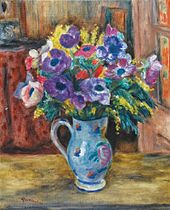Polish flowers
Polish Flowers (Polish: Kwiaty Polskie) is an epic by Julian Tuwim , composed between 1940 and 1953, first during war exile in Brazil and the United States , then from 1946 in Warsaw . It is considered the poet's masterpiece and his ruthless reckoning with the Polish past. The work remained unfinished because of the untimely death of the poet.
The first fragments appeared in the Polish London magazine "Wiadomości Polskie, Polityczne i Literackie" since 1941 and in the London monthly "Nowa Polska" since 1942. In Poland the epic first appeared in 1949 in a form severely curtailed by the censors . The first, almost uncensored, full edition appeared after the poet's death in 1955 in the state publishing house "Czytelnik". The work consisted of about 8000 lines. The first edition contains 18 pages of text variants in the appendix as well as the fragments withdrawn by Tuwim himself. So far, around 600,000 copies of “Polish Flowers” have been published.
The work was first violently attacked by the Communist-influenced literary criticism, it was only after the Polish October that factual, benevolent reviews appeared.
The epic was created according to the principle of a dream - the most varied of stories from four decades are intertwined into a whole with unnoticeable transitions. Lyrical and epic fragments alternate in the epic. The action takes place mainly in Tuwim's hometown Łódź , starting around 1905, in the times when the city belonged to Tsarist Russia . Some fragments are written in the Łódź crooks' language.
The gardener Ignacy Dziewierski patiently ties together a tall bouquet of brightly colored Polish flowers. His daughter Zofia marries a Russian officer Ilganov, who later commanded a group of Ekaterinburg soldiers during the Łódź workers' uprising, who killed some insurgents in the street fighting and was killed by one of the workers, Jan Mergiel himself. Mergiel also dies in the slaughter. The widowed daughter dies three months later while giving birth to their daughter Aniela. The gardener is raising his orphaned granddaughter. During the First World War , Dziewierski fought in the ranks of the Polish legions against the Russians in order to take revenge for his misfortune. He tries to raise his granddaughter to be a Polish patriot, but Aniela idealizes her fallen father under the influence of the old pharmacist who is in love with her. She marries the wealthy businessman Fryderyk Alfred Folblut, becomes pregnant and later murdered by Kazimierz Mergiel, son of one of the workers who died in 1905.
Unexpectedly, in the midst of the epic Dziewierski family history, Tuwim's personal statements about his homesickness, his concern for his mother who remained in Nazi-occupied Poland, calls for revenge for the Nazi war crimes, visions of a happy future after the war appear.
A fragment from the “Polish Flowers”, entitled “Grande Valse Brillante”, was set to music by the composer Zygmunt Konieczny around 1964 and sung by Ewa Demarczyk in the Kraków Piwnica pod Baranami (cellar to the rams) .
The composer Mieczysław Weinberg created his 8th symphony for tenor, soprano, alto, choir and orchestra "Polish Flowers" op. 83 in 1964.
A fragment of Tuwim's prayer for truth is often quoted:
|
Lecz nade wszystko - słowom naszym |
And above all - give back to our words, |
| (First edition 1955, p. 106) |
Individual evidence
- ^ Julian Tuwim: Kwiaty Polskie . Czytelnik 1955
- ↑ Grande Valse Brillante (1964)
- ^ Mieczysław Weinberg - Symphony No. 8 "Polish Flowers" NAXOS 8.572873, CD, DDD, 2013
